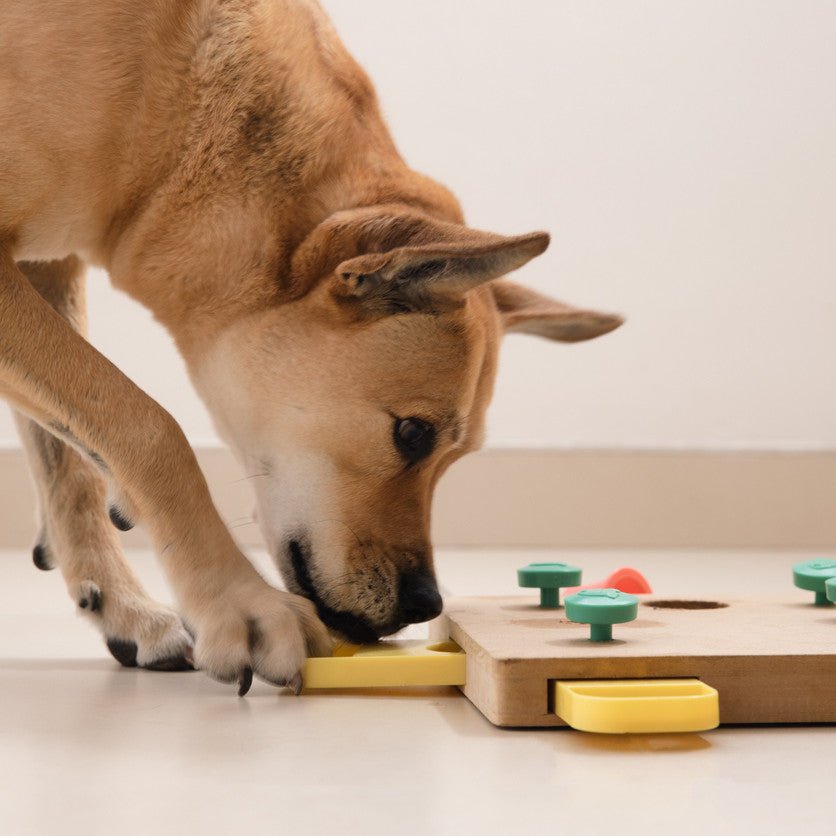Dog Science Series: What to Do About Dog Anxiety

Thunderstorms. Loud noises. Being left home alone. Getting acquainted with a new daycare facility. A dog's mystifying ability to understand the letters "DVM" when painted on a building. If you're a pet owner, then you likely recognize these as potential triggers for your dog. Also, you may have tried everything from ThunderShirts to diffusers loaded with lavender oil to calm your pooch, only to find that it's never enough—because, in reality, there's no single trick to solving dog anxiety.
But if you prepare your dog using the proper techniques and fill your toolbox with everything from enrichment toys and compression jackets to appropriate meds, you can spare them and yourself from serious dog anxiety issues.
Common Signs of Anxiety in Dogs
When our dogs are upset, they sometimes do things that upset us. Unfortunately, our own responses to these behaviors often compound their anxiety, creating a vicious cycle. It's a major—and usually preventable—reason why people give up their dogs.
These are the behaviors most often associated with dog anxiety and stress:
- Urinating and defecating "accidents"
- Drooling
- Destructive behavior
- Excessive barking
- Aggression
Once we realize our dog isn't just being "bad," how can we make things better? Like us, dogs experience mental health challenges and therefore benefit from a little professional help now and again.
Step One: Visit Your Vet
Your first priority is ruling out any medical conditions that might be causing the symptoms associated with dog anxiety. Once your pet's been given a clean bill of health, your vet can help you determine the type of anxiety your dog's experiencing. Two common conditions are:
- Generalized anxiety: This is a disorder in which a dog experiences continuous mental discomfort, regardless of whether a trigger is present. Dogs with generalized anxiety disorder (GAD) usually require a combination of anxiety medication and behavioral training.
- Situational anxiety: Dogs that usually only show signs of anxiety when confronted with specific circumstances, such as riding in a car, hearing fireworks, or encountering a young family member who has accidentally hurt or scared them, experience situational anxiety. This can often be treated without prescription medication—but rarely without behavioral anxiety treatment.
You can discuss with your vet the treatment most appropriate for your individual dog. They can refer you to a reputable veterinary behaviorist.
Over-the-Counter and Prescription Anti-Anxiety Medications and Treatments for Anxious Dogs
To best advocate for your dog, it's a good idea to become familiar with common medications and products used to treat dog anxiety. These include:
- Clomipramine: This is an antidepressant used to treat the most common symptoms of situational anxiety in humans. But it's also the first FDA-approved treatment for separation anxiety in dogs.
- Other "human" prescription medications used for dogs include:
- Alprazolam
- Amitriptyline
- Buspirone
- Diazepam
- Fluoxetine
- Lorazepam
- Paroxetine
- Sertraline
- Adaptil: This brand's line of sprays, diffusers, and collars contain pheromones thought to send "comforting messages" to dogs and puppies, calming them under potentially stressful situations.
- Cannabidiol (CBD): CBD, which can help relieve stress, anxiety, and pain in pets, comes from the cannabis plant. But it doesn't have the psychoactive chemicals that cause the "high" experience. It's important to get a CBD product—oral or topical—specifically formulated for pets. Your veterinarian can recommend the best product for your pet, taking into account the dog's breed, weight, age, and medical history.
- Compression shirts: While not exactly a medication, products like ThunderShirts work by replicating the secure feeling of squeezing into a cozy, safe den. Studies show they help calm anxious dogs, especially as part of a multi-pronged treatment approach.
What About Essential Oils?
Many essential oils are highly irritating to pets' skin and respiratory systems, and some can be lethal to dogs in high doses. Veterinary studies have deemed small amounts of lavender oil safe. But it's best to consult with your own doggie doc before using essential oils topically or in diffusers.
Behavioral Modification and Training Methods to Reduce Dog Anxiety
A pet behaviorist can work with you and your anxious dogs using one or more of the techniques below:
Counterconditioning
What if your dog started associating fireworks with their very favorite treats?
Counterconditioning is a type of positive reinforcement that rewires a dog's attitude toward a specific stimulus. With plenty of patience, belly rubs, and sweet potato treats, you can then turn Independence Day into a party your dog will actually enjoy!
Desensitization
Desensitization is the process of slowly and gradually exposing your dog to a situation so that, eventually, it won't trigger them. This often includes counterconditioning strategies and requires the pet owner to be very familiar with their dog's body language.
Enrichment
Dogs feel bored, just like us. But that boredom can cause stress and anxiety in working breeds. Border collies, for example, are extremely intelligent herding dogs with an intrinsic need to do a "job," be it herding sheep, running agility courses, or finding every single sock in the house and burying it in the backyard. So what would YOU rather they do?
A dog doesn't have to be a working breed to need mental stimulation and "enrichment" exercises. All dogs benefit from puzzle toys, learning new tricks, and other problem-solving challenges. A skilled behaviorist can also recommend several enrichment activities for your specific dog.
Give Your Dog Their Own Safe Space
At Animals Matter, we offer luxurious pet furniture that makes your dog feel at home, from posh dog loungers to protective car seats. And when it comes time for some pawsitive reinforcement, your pet will love our very own organic sweet potato crisps! Contact us today to learn more about our ever-growing line of top-quality dog products.
FAQs
How do you calm a dog with anxiety?
This depends on the dog's behavior, the type of anxiety, and the circumstances. But in general:
- Don't punish a dog that is expressing anxious behavior.
- Make sure the dog has a "safe space" to retreat to, whether it be their crate (kennel) or a familiar dog bed.
- Distract them from the trigger with puzzle toys, exercise, and positive reinforcement techniques.
- Speak to them in a gentle, reassuring voice.
What are some ways to prevent dog anxiety?
Dog owners can "bomb-proof" their pets over time using these approaches:
- Providing socialization opportunities and gradual exposure to new experiences and settings
- Giving them adequate and regular exercise
- Providing mental stimulation through puzzle toys, trick training, and problem-solving games
- Not making a big deal of arriving or leaving home, meeting new people, or encountering potentially stressful situations
- Recognizing through body language when their dogs need reassurance vs. "alone time"
How are dogs with anxiety treated?
Dog anxiety treatment usually requires multiple approaches. Some options are:
- Veterinarians can prescribe anti-anxiety medication and antidepressants,
- Dog owners can purchase over-the-counter supplements, ThunderShirt-type compression jackets, and special toys.
- Pet parents can work with a veterinary behaviorist or qualified dog trainer to directly address their dog's behavioral problems and triggers.
1 comment
Subscribe
Sign up to get the latest on sales, new releases and more…
Categories
- How to Get a Fearful Dog to Trust You: A Compassionate Guide for Rescue Dogs
- What Is Dog Boarding? A Complete Guide to High-End Stays for Your Dog
- Dog UTI Symptoms: How to Spot, Treat, and Prevent Urinary Tract Infections
- Psyllium Husk for Dogs: Science-Based Benefits, Dosage and Use
- Dog Meal Prepping : A Complete Guide to Healthy, Time-Saving Homemade Meals
- Best Places to Take Your Dog on Vacation this 2026(USA Edition)
- Tails of Celebration: Working Dogs of the Lares Trek, A Silent Partnership In Peru
- 5 Easy Organic Christmas Recipes for Dogs: Simple Holiday Treats Your Companion Will Love
- The 6 Best Luxury Gifts for Your Dog This Christmas: Thoughtful Holiday Comfort That Truly Lasts
- Why Playtime Matters: The Benefits of Mental Stimulation and Playtime with Your Companion
- Tails of Celebration: The Miao Dog-Carrying Festival - A Hero's Honor in China
- A Dog-Friendly Thanksgiving 2025: Comfort, Calm, and Easy Treat Recipes
- The Best Dog Beds for Winter 2025: 5 Luxury Styles for Warmth, Comfort & Orthopedic Support
- Tails of Celebration: The Feast of Saint Hubert — Belgium's Timeless Blessing
- Halloween Safety Tips for Dogs: How to Keep Your Companion Safe This Spooky season
- Tails of Celebration: Día de los Muertos / Day of the Dead for Pets, A Festival of Memory in Mexico
- How to Care for Senior Dogs in Fall: Mobility Tips & Joint Support
- Tails of Celebration: Kukur Tihar & The Tihar Festival of Nepal
- What is a VDI Testing for dogs ? : Insights, Procedures and Preventive Measures
- Cheap Dog Beds vs. Luxury Dog Beds: The Real Cost of a $50 "Disposable" Dog Bed
- Can Dogs Have OCD? Understanding Canine Compulsive Behaviors (CCD)
- Does My Dog Like Music? Find Out What Tunes Make Your Pup Wag!
- Effective Solutions for Food Aggression in Dogs
- 7 Frozen Treats Your Dog Will Love This Summer☀️🧊🍉
- The Best Waterproof Liners for Dog Beds: Protect Against Spills, Drool, and Accidents
- How to Cope with the Loss of a Dog: A Tribute to Every Companion We Carry in Our Hearts
- Top Tips on How to Prevent Matting in Dogs
- Understanding and Managing Dogs with Hip Dysplasia
- The Ultimate Guide to Dog Gut Health: Natural Remedies, Probiotic Insights and Signs of Poor Gut Health
- The Best Supplements for Dogs: Explore Top Picks for Canine Health and Wellness
- How Often Should I Brush My Dog's Teeth? Tips for Optimal Canine Dental Health
- Ultimate Guide on How to Comfort Your Dog During Fireworks this 4th of July
- Managing a Blowing Coat: Essential Grooming Tips for Double-Coated Dogs.
- 5 Daily Habits That Boost Your Dog’s Long-Term Wellness
- Mastering Crate Training a Dog: Tips and Benefits
- Dog Car Seats vs. Seat Covers: What’s The Best Option For Your Companion?
- Best Outdoor Dog Beds: Luxury, Durability, and Unmatched Comfort
- Is My Dog Overweight? Tips to Assess and Help Your Companion
- The Best Faux Fur Dog Beds for Ultimate Pet Comfort of 2025
- Dog Running Guide: How to Start, Train & Stay Safe when running with your Dog
- Indestructible Dog Beds? The Truth Behind the Term
- Top Tips for Effective Exercise for Dogs
- Effective Dog Ear Cleaning: A Step-by-Step Guide for Maintaining Healthy Ears
- How to Manage Dog Aggressive Behaviors: Expert Tips and Advice
- Effective Canine Ear Infection Remedies: Symptoms, Causes & Treatments
- How to Make a New Dog Comfortable in Their New Home - 2025 Guide
- Signs of Dog Allergy Symptoms and How to Help and Prevent Them
- Why Does My Dog Lick Their Paws? Causes and Solutions Explained
- Dog Alzheimer's: Symptoms, Causes, and Treatment Options
- The Legacy of Comfort with the Iconic Animals Matter® Ortho Companion-Pedic® Puff Luxury Dog Bed


I’ve Learned an lot about how to deal with my dogs Anxiety. The information I read was very helpful. Thanks :
Leave a comment
Please note, comments must be approved before they are published